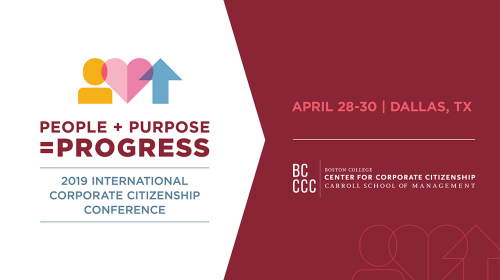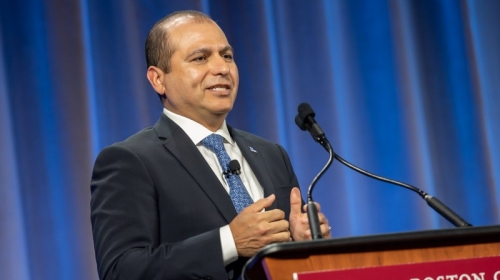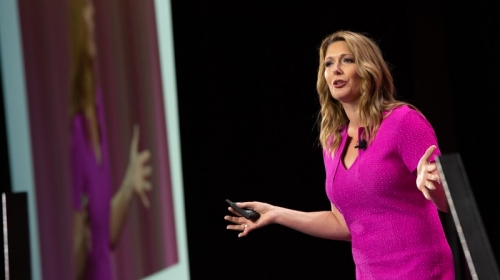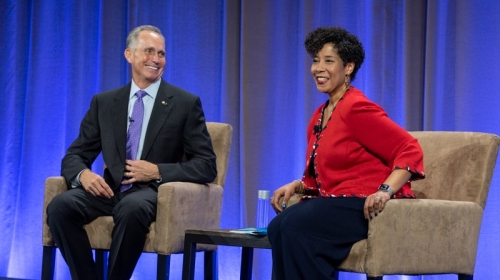The Boston College Center for Corporate Citizenship will welcome hundreds of professionals for two-and-a-half packed days of learning and networking.
2019 Corporate Citizenship Conference Recap Day 3: Aligning people with purpose to create progress
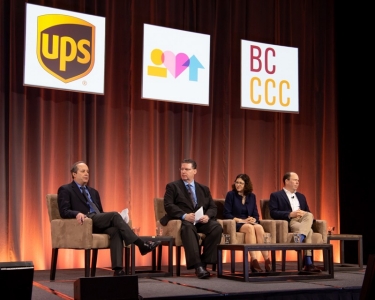
Attendees entered the final day of the 2019 International Corporate Citizenship Conference feeling refreshed and ready to glean more insights to inform their CSR work. Some early-risers chose to find that energy in a morning yoga session hosted by Blue Cross Blue Shield of Massachusetts and Blue Cross Blue Shield of Texas—while others headed straight for breakfast in the Landmark Ballroom, eager to start the day with an eye-opening general session on how companies can respond to the new normal of disaster relief.
From reactive to proactive response
UPS hosted this morning’s session, “Making your disaster philanthropy and engagement more strategic,” which featured a panel moderated by Joe Ruiz, the director of humanitarian relief and resilience, environmental sustainability and communications at The UPS Foundation. He was joined by Robert G. Ottenhoff, president and CEO of the Center for Disaster Philanthropy; Renee Wizig-Barrios, the senior vice president and chief philanthropy officer of the Greater Houston Community Foundation; and Zack Rosenburg, who is co-Founder and CEO of SBP.
Ottenhoff opened with some stark statistics on the increased prevalence of disasters due to climate change, and their devastating effect on communities and the economy alike. In 2018 alone, the United States experienced more than two dozen billion-dollar weather and climate disasters, he said, from wildfires in California to Hurricanes Florence in the Carolinas. Foundations and corporate giving programs have been increasingly supporting disaster relief, pledging $684 million in 2017. However, the way companies give to disaster relief could be much more strategic. In the United States, disaster giving is quick and largely reactive, with most contributions happening in the first two weeks and stopping altogether after 6 months on average, according to Center for Disaster Philanthropy figures.
"Very little money is going into risk reduction and long-term recovery, so there is opportunity for donors to think about the full life cycle of disasters,” said Ottenhoff. “In addition to a reactive response, consider the long-term impact of rebuilding that community and making it more resilient for the next disaster to come.” He went on to recommend that corporate givers plan their dollars ahead for the inevitable occurrence of disasters, and think holistically about using company core competencies to support prevention and mitigation efforts.
After the remaining panelists joined Ottenhoff, attendees learned that UPS is already working toward these goals with its Humanitarian Relief and Resilience Program. Ruiz said the program prioritizes preparedness and capacity building first in its work stream, which incorporates post-crisis recovery and public health strengthening in addition to urgent response. To achieve this, UPS uses its internal capacity and expertise as a logistics company. As an example, he discussed the company’s innovative leveraging of its drone technology to assist on-the-ground organizations in numerous disasters—from Hurricane Harvey relief to vaccine delivery in Ghana.
“You can simply make a contribution, or you can go deep and use your superpowers as a company to make change on an issue. We have unique capabilities and have been able to leverage our logistics expertise to enhance the safety and stability of communities affected by disaster.” said Ruiz. He later echoed a common event theme of the power of leadership buy-in. He continued, “We’re no longer a checkbook foundation, which has been made possible by the leadership of our CEO. Engaging senior leaders in the process really mobilizes your employees. When leaders are bought in, the passion is there and the frontline employees will follow.”
Partnerships are crucial to doing this work effectively. Because a majority of emergency response spending is usually dedicated to logistics, UPS is a well-suited partner for these programs. UPS's role in their disaster relief partnerships, such as the LET, is to contribute their employee expertise pro bono to nonprofit organizations operating in disaster-affected areas. Representing organizations that work with companies like UPS to address disasters and other ESG issues, Rosenburg and Wizig-Barrios weighed in.
Wizig-Barrios built on the conversation based on her philanthropic experience with Hurricane Harvey, in which the Greater Houston Community Foundation found itself overwhelmed by the generosity of companies, both locally and nationally. “For us it’s about passionate and immediate response, but the longer-term recovery was also really important,” said Wizig-Barrios. “We learned that there was a need for behavioral health support, which does not emerge until 6-10 months after a disaster. Legal services is another area that people don’t really think about, but we often encounter issues with tenants and contract fraud in the long term as well.”
Rosenburg agreed that companies like UPS are right to engage in more than just “checkbook” philanthropy. “Any NGO will steward and spend your dollars effectively and responsively, but at some point that bank account will reach zero. But the bank account of skills and capacity will last years and years,” said Rosenburg. “If you use your best asset, your people, that’s how you will really provide rocket fuel for the organizations you care about in the long term—because a community is not healed until everyone is home.”
UPS works with partners to create tools and resources for that long-term response. For example, Wizig-Barrios mentioned that mold and other infrastructural issues can set in after a disaster. Preventative and supportive tools and resources are essential for communities affected by disaster and can help ensure resiliency in the long term. UPS has worked with the U.S. Chamber of Commerce on the Resilience in a Box tool to support local business leaders affected by disaster, and SBP provides post-disaster recovery resources for survivors of disaster.
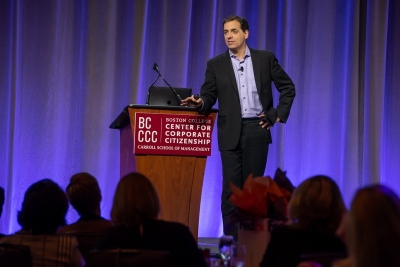
The drive to give back
Attendees emerged from their rousing morning discussion ready to engage in productive conversation with peers and learn best practices direct from leaders in the field. The agenda delivered with another set of breakout sessions on storytelling, global corporate citizenship, and a look at the findings from the forthcoming 2019 Community Involvement Study. EY also led an interactive case study discussion on their use of mentoring to engage employees and empower youth.
The morning’s breakouts were followed by another networking break, brought to attendees by Gallagher. Attendees then went on to enjoy their final series of breakout sessions, where they were able to explore inclusion and diversity, the role of corporations in climate change, as well as how to align and implement the Sustainable Development Goals (SDGs). In the final case study, attendees learned how to deliver both business and social value from Toyota.
Attendees then reconvened in the Landmark Ballroom one last time. Boston College Center for Corporate Citizenship Executive Director Katherine V. Smith welcomed the crowd with the great news that, in the effort to strive for zero-impact—with support from Subaru of America and the Allstate Foundation—the Conference donated 1,300 pounds of uneaten food to Dallas Life homeless recovery program. Smith thanked Mary Kay and all of the event sponsors for their generous support, and invited attendees to save the date for the 2020 International Corporate Citizenship Conference on Mar 30-April 1 in San Francisco.
Smith then introduced the crowd to next year’s convening sponsor, FedEx, which brought to the stage Brian Phillips, president and chief executive officer of FedEx Office. During his remarks, Phillips described CSR’s focus areas and commitment to volunteering and monetary investments in the communities they serve. At the companywide level, FedEx has made a commitment in 2016 to invest 200 million in over 200 global communities by the year 2020.
“The theme of this year’s conference is People + Purpose = Progress, and that’s a perfect fit for FedEx,” said Phillips. “We built our reputation on our company’s ability to connect people and possibilities around the world. It’s the focus of our work—and it’s actually the focus of our CSR efforts as well.”
The audience then learned about FedEx’s CSR focus areas, in which the company leverages its internal resources and expertise and applies them to solving the world’s most pressing problems. He detailed a few specific and exciting initiatives in disaster relief, sustainable transportation, inclusion and diversity, road safety, and sustainability. In fact, FedEx’s sustainability efforts have contributed to a 37 percent reduction in CO2 emissions intensity on a revenue basis across the enterprise since 2009, a period in which revenue grew by 84 percent.
Phillips then welcomed the keynote speaker Daniel H. Pink, best-selling author of When: The Scientific Secrets of Perfect Timing, To Sell Is Human: The Surprising Truth About Moving Others, Drive and A Whole New Mind. Pink led a conversation of how to engage employees using a different kind of motivation that resonates with the knowledge workers of today, who are driven by mastery, autonomy, and purpose.
“In organizations, we use ‘if-then’ rewards, that is, ‘if you do this, then you get that.’ Fifty years’ worth of social science tells us that these are great for simple and short-term tasks, but not so great for complex and long-term” said Pink. However, he emphasized that what has been long established in the social sciences has not made its way into business incentives. Although the tasks of knowledge workers have become increasingly more complex and longer-term, business leaders continue to motivate employees using more extrinsic motivators.
Pink emphasized how valuable these takeaways are for corporate citizenship professionals, whose efforts strive to engage employees and so often depend on them to drive community involvement goals. When people feel like they are contributing to a bigger cause and that they’re making progress, they are more productive and feel more dedicated to the company. In many ways, CSR professionals strive to give their employees purpose—however, often that purpose is too weighty to keep up the motivation momentum.
“Purpose is corporate social responsibility. It’s powerful and it enhances performance. However, it’s very hard to get access to that kind of purpose every single day on the job,” said Pink. He did provide an actionable recommendation for accessing everyday purpose. He continued, “A lot of time when we look at our leadership and motivation, we focus very much on the ‘how’ and we short shrift the ‘why.’ Here is the single best intervention you can make: Next week, have two fewer conversations about ‘how’ and two more about ‘why.’”
And with that the 2019 International Corporate Citizenship Conference came to a close. The CSR professionals in the room left the Hyatt Regency ballroom with a refreshed perspective and new ideas to apply to their work—inspired to continue connecting people to purpose to make progress.
We’ve been covering the 2019 International Corporate Citizenship Conference with daily recaps and deep dives into the event’s unique content. Subscribe to the Corporate Citizenship Perspectives blog to hear more from the Center throughout the year.
Related Content
The annual event for corporate citizenship professionals kicked off in Dallas with the presentation of the 11th annual Film Festival awards.
The morning’s sessions brought insights about the business case for community involvement, what makes a successful CSR program, and initiatives to improve the STEM talent pipeline.
The final hours of the day delivered lessons learned from companies engaged in corporate citizenship efforts that have strong ties to a sustainable business purpose.

